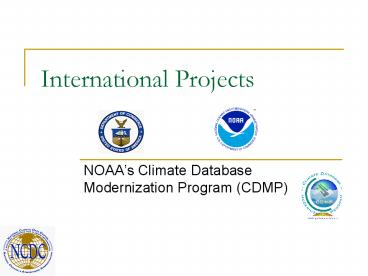International Projects PowerPoint PPT Presentation
1 / 9
Title: International Projects
1
International Projects
- NOAAs Climate Database Modernization Program
(CDMP)
2
NOAA the Uruguayan Meteorological Service enter
cooperative project on data rescue. The U.S.
National Oceanic and Atmospheric Administration
(NOAA) donated digital equipment used for the
project.
Images received from the Uruguayan Meteorological
Service and the Uruguayan Navy Include 42,000
images through February 2006 This includes 6
synoptic stations with observations early as the
1930s and as recent as early 2004. NCDC is
developing a keying format and keying should
begin by Summer 2006. Total imaging/keying for
this multi-year project involves data from over
30 stations totaling nearly 1,000,000 records
3
Camera and Imaging Setup In Uruguay
High tech (35 mm) cameras and camera stands are
set up in a well lit environment Technicians are
trained to image the records using the camera
equipment Technicians check for quality,
exposure and completeness during the imaging
process of each station Digital jpeg images are
stored in the cameras hard drive then
transferred to the computer Images on the
computer are then written to CD-ROM or DVD and
sent to NCDC for storage and keying
These same procedures are generally followed at
the other international locations. A technical
leader responsible at each international location
is critical
4
Mexican Surface Project
401,280 synoptic and daily records imaged by
camera by Meteorological Staff in Mexico
Period of record covers 1877-1981. Data will be
keyed from the imaged records and added to
NOAAs database. Data useful in water supply
and
drought monitoring
activities in the
Americas
5
European Data Rescue Activities
- European Ship logs and documentation were
imaged by camera at the British Museum. The
records will be added to NOAAs marine global
(ICOADS) database. - Roughly 250,000 observations from the 1938-1947
were imaged and loaded to the NCDC WSSRD system
(53 GB). These images are accessible to
researchers without charge with a user name/ID at
noaa.imcwv.com The next step was to key data
from the 250,000 observations
6
European Data Rescue Activities
- The meteorological/oceanographic data was then
keyed from these images- this translates to over
31 million keystrokes - These logbook data have a wide international
application. More extensive work on the SST
measurements from the logbook observations is
expected to result in new versions of the HadSST2
dataset (Rayner et al. (2006)). The observations
also include dry and wet-bulb air temperature
measurements, which will contribute to any future
versions of the nighttime marine air temperature
dataset - The pressure observations will be used not only
in any future versions of gridded pressure
datasets like EMSLP and HadSLP (Ansell et al.
(2006) Allan and Ansell (2006)), but also will
be assimilated in general circulation model
reanalyses covering the period notably the
Twentieth Century Reanalysis Project (Compo et
al. (2006)). - Keying formats developed by CDMP contractors in
keying WW2 logbooks may streamline the process
and keep costs down in dealing with EIC and WW1
ship logbooks. - Depending on the volume of images and amount to
be keyed, CDMP maybe able to contribute some
funding to keying as was done with the WW2
logbooks. That commitment is uncertain and
depends on FY 08 and outyear budget.
7
African Upper Air Project
- Total of 194,333 images of pibal records received
to date from Kenya, Malawi and Senegal - Pibal data contain upper air wind observations
for various stations from these countries from
the 1960s to 2003. - These data are being keyed and after passing
quality control checks will be entered in NOAAs
global upper air database - Digital files of these data will be provided to
the partner countries that imaged the data - Project will expand to Mozambique and Zambia
later in 2006/2007
Kenya
Senegal
Malawi
8
Additional International Projects
- Imaging and keying international lightship
logbook data from Finland and Sweden covering the
period from the 1860s to the 1930s will be
added to NOAAs global marine database
- Processing historical and current incoming
Canadian marine data via NCDCs incoming records
system. These marine data from the period are
added NOAAs marine database
9
Additional International Projects
- Foreign Climate Data Imaging by NOAAs Central
Library- Project goal of the project is to
preserve and disseminate unique climatological
data from historical sources. - Period of record covers 1830s through the 1970s
with most data from the period prior to 1960.
Each series typically includes observations for a
number of meteorological and other geophysical
parameters. - Involves documents from over 14 countries in
Africa, 8 in Asia, 6 in Europe, 10 in North
America, 1 Pacific Island and 8 in South America.

